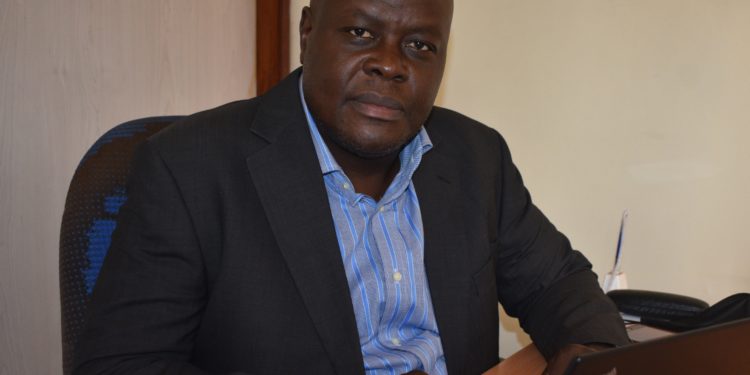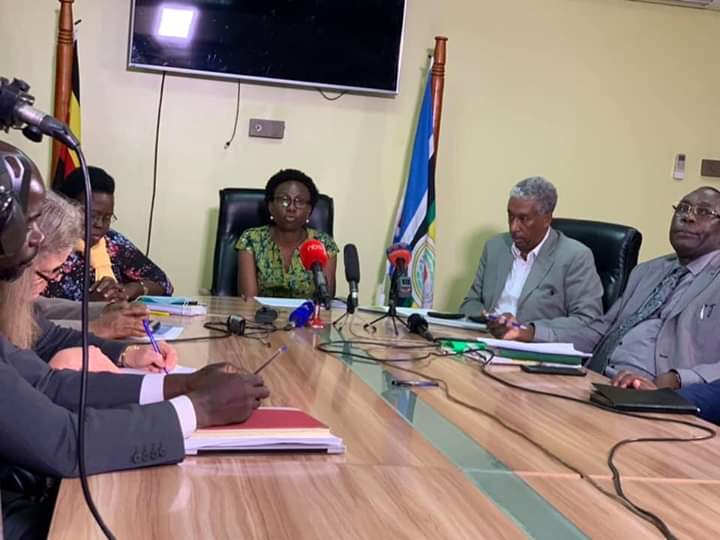About 17 years ago, Uganda introduced the Vegetable Oil Development Project (VODP) to establish oil palm-growing and commercialize it in mapped regions of the country, with financial backing of the International Fund for Agricultural Development (IFAD) and the Government of Uganda (GoU). VODP, under the Ministry of Agriculture, Animal Industry and Fisheries (MAAIF), was first piloted as an innovative public-private-producer-partnership (PPPPs) in Kalangala District.
A decade after it started, VODP successfully supported over 2,000 smallholder farmers to benefit directly as oil palm-growers, on over 4,800 hectares of plantations. The GoU renewed VODP to phase II (VODP2) and after VODP2, Government ushered in the National Oil Palm Project (NOPP). Peter Wamboga-Mugirya sought out NOPP’s Robert Charles Aguma, the Environment Health and Safety Officer (EHSO) to discuss the state of the ecosystems in the project areas.
Question: First and foremost, is establishment of oil palm trees equivalent in terms of flora ecological functions, to those the original tropical trees play?
Answer: Oil palm establishment is not done within areas that are protected, where there is a high concentration of tropical trees. Oil palm trees being a monoculture are not comparable to tropical forest ecosystems in terms of ecosystem functionality. However, as part of the environmental and social impact assessment, detailed ecological studies are carried out prior to establishing oil palm plantations. Based on these studies, recommendations are made as to suitable sites for oil palm growing that would best minimize impacts on ecosystem functionality.
Q: What is the strategy by NOPP on how the environment is managed in the oil palm-growing regions of Uganda?
A: NOPP has an Environmental Management Policy that guides implementation of environmental and social safeguards. The policy prevents degradation of the environment as well as reducing risks to the health and safety of project beneficiaries and the communities in the areas where the project will be implemented. Where oil palm growing is on-going or has commenced, implementation of environment health and safety activities is done within the framework of the National Environment Act (2019), the Principles and Criteria of the Round Table on Sustainable Oil Palm (RSPO) and the IFAD Social, Environmental and Climate Assessment Procedures (SECAP). Reference will also be made to policy guidance of other International Funding Institutions (IFIs) especially the World Bank’s Special Framework for Engagement in Oil Palm Subsector. Through the policy, the NOPP intends to build the capacity of NOPP to be able to articulate environmental health and safety (EHS) policies (national and international) and to actively drive the implementation and execution of the various requirements and principles. The EHS policies are constantly communicated to stakeholders including partners, contractors, beneficiary farmers and the wider community. The NOPP aims at fostering a safety culture that supports the goal of zero health, safety and environmental incidents. The NOPP strives to promote a work culture where stakeholders identify, communicate and address unsafe acts, conditions and events. Implementation of the NOPP policy has been on-going since its inception in 2018.
Q: How does MAAIF/NOPP work with the Ministry of Water and Environment (MoEW) and the National Environment Management Authority (NEMA) to design/formulate, publish and introduce/implement environment management measures in oil palm-growing areas?
A: Specific environmental issues are dealt with relevant experts directly from the respective institutions as and when the need arises, in accordance with their mandates, policies and the law.
Q: Does NOPP have specific environment management measures in some areas of oil palm-growing that differ from those of other specific areas? Put differently: has NOPP designed and implemented area-specific environment-protection strategies/plans and measures? If yes? What are they?
A: NOPP facilitates environmental governance structures known as Local Environment Committees (LECs) up to parish level. In total, up to 516 LECs are expected to be established. Subject to being trained, LECs are expected to provide routine guidance to smallholder farmers on environmental management issues. The process of establishing and strengthening the LECs has already commenced in Kalangala and Buvuma hubs and already, seven have been formed.
In accordance with the National Wetlands, Riverbanks and Lakeshore Regulations, 2000, the NOPP has engaged with NEMA to demarcate the regulatory 200-metre lakeshore buffer zone in Kalangala and Buvuma hubs. The demarcation exercise has commenced in Kalangala and is due to be extended to Buvuma starting June, 2021. Similar engagements to assess wetlands and forest reserves in Buvuma have been initiated with the respective institutions that are mandated with protecting and managing these protected areas i.e. the Wetlands Management Department of MoWE and NFA. Implementation of the NOPP is strictly undertaken following environmental and social impact assessments in accordance with provisions of the National Environment Act (2018). The overall purpose of instituting these measures is to ensure that oil palm growing is carried out sustainably without significant interference with respective ecosystem functionalities.
Q: In evaluation of your environment management measures, how have the oil palm farmers adhered to them, on one hand? On the other hand, what are the regulatory agencies’ evaluation reports on NOPP and oil palm farmers’ work on Kalangala Island so far?
In Kalangala, a few farmers (comprising 5% of the total planting of 11,348 ha) grow palms in the 200-metre lakeshore buffer zone. These have since been sensitized and trained on best management practices such as no-fertilizer application, planting of the cover crop and the use of appropriate sustainable land management technologies e.g. use of water retention trenches especially on steep slopes. An environmental audit was carried out for the nucleus estate on Bugala Island in Kalangala and the compliance level was found to be quite satisfactory. Areas for improvement that were identified have so far been plugged. Environmental audit for the smallholder scheme is due to commence soon. Establishment of oil palm gardens in Buvuma is being undertaken with strict guidance to farmers not to encroach on protected areas.
For marriage, family, love, job/promotion. Goodluck in your business/lottery, court cases, diseases and other Spells kindly call Kiwanga Doctors on +254 769404965 or CLICK HERE
Do you have a story in your community or an opinion to share with us: Email us at editorial@watchdoguganda.com



